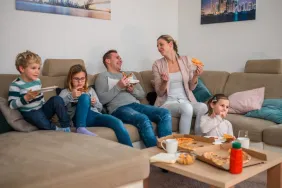Too many people go through life in unhealthy or harmful relationships because they don’t see what’s happening, think they’re imaging what they don’t like about it, or believe that their friendship can somehow change the other person for the better. On the flip side, I can’t tell you how many times I’ve heard stories of regretful people who either let a good friend slip away, or felt an immediate kinship upon meeting someone, but never attempted building a friendship with that magical human put in their path. By showing my kids that relationships are worth contemplating, discussing, and being more active in, hopefully they’ll grow to be deliberate participants in finding the right friendships for them instead of stagnant accepters of whomever decides to spend time with them (or not).
By middle school, our kids are doing a lot of socializing on their own in and after school, making new friends we may only meet during last-minute carpools or if they happen to come by our house. By high school, they’ll have friends we may never meet, and will be very independent in a blink of an eye (hello, driver’s license). Guiding our kids into being able to make good choices in who they spend their time with, how they should be treated by those people, and how they treat those people sooner rather than later will help them in the long run. It is a skill to be learned, and it’s up to us to teach it.
Here are a few ways to get those conversations going.
If You Don’t Like Joe, Don’t Say, “I Don’t Like Joe. You Can’t Hang Out with Him Anymore.”
I know what it feels like to see your kid hang out with someone you’d like to punt into the stratosphere, but that is both poor role modeling and also rather illegal. And straight-up telling them you don’t like their friend Joe is a surefire way to make your kid love Joe more than any other human on the planet, and receive fired-up anger hotter than the sun aimed straight for you. (Sorry, that’s just Kid 101. I don’t make the rules.)
A better tactic is to think to yourself exactly what it is you don’t like about Joe. Which behavior triggers that feeling, and is it really about him and your kid, or something to do with you? (We all have internalized biases and we all have different tastes in people we want to spend time with, so before you start on this path, make sure the problem isn’t yours alone.)
Once you’ve confirmed the issue isn’t just you, and you have pinpointed the behaviors that make you want to keep him away from your kid, the negative effects those behaviors have on your kid, and a few real examples of those behaviors to remind your kid of, it’s time to have a two-way conversation.
In a comfortable setting, open up. (I find distracted situations, like when you’re both doing the dishes together or driving somewhere just the two of you, work well.) Lead them into a dialogue that gets them to tell you more about their friendship with Joe, what they like about him, and what they get out of hanging out with him.
- I don’t know Joe very well. What do you like about him?
- You said he’s [insert positive descriptor here]. What makes you think that?
- I’ve noticed that you don’t always seem as yourself when hanging out with Joe than you do most of your other friends. What’s going on there?
Then get to your concerns, which you are running by your kid. Show that you value their opinion, that this is a moving conversation and not a stop sign.
- I like that you have fun with Joe when [insert example your kid gave here], but I’ve seen something go on between you a few times that worries me. Can I tell you what that was?
- I had a friend like Joe before, and as much as I liked [X] about him, sometimes it felt like he was [insert your worry here, like: using me to get closer to my sister; a good friend when it was just us, but ignoring me in school; trying to get me to do things I already told him I didn’t want to, etc.]. Have you ever felt like that about Joe?
- I saw the way Joe [insert concerning example here] last week, and it made me mad on your behalf. How did you feel about what he did that day?
- It seems like you’re comfortable with Joe, but I’ve been made uncomfortable with how he [insert examples here, especially if it’s direct you-and-Joe interactions your kid may not have seen]. What do you think about that?
The goal here is to get a better picture of the relationship between your kid and Joe, help your kid understand your concerns, and see where you two can compromise on how to move forward.
Maybe you can trust your kid to continue this friendship with open eyes and trust they make the choice to step away from it on their own, if it comes to that. Maybe they need time to process this information before seeing their friend again, and will want some tips on how to talk to Joe about the things you brought up. Maybe they already consider Joe just a “peripheral friend” because he follows the group who comes to your kid’s hangouts, and your kid knows to keep him at arm’s length.
Or maybe you see enough evidence that this friendship isn’t healthy that you do, in fact, need to make the call for your kid to stop hanging out with/communicating with Joe. Hopefully a calm conversation (or conversations over time) where you do the work to understand their relationship first and your kid shows a willingness to listen to your concerns will help make that call a bit less dramatic for all.
However, if you believe your kid is being abused in any way and/or appears in danger, that is reason enough to intervene immediately: no niceties necessary. Explain why you are cutting the relationship off, then reach out to resources (like a school counselor or private therapist) to get your kid the help they need to understand what they experienced, how to heal, and how to move forward from there.
That Friend Is So Good for them That You Want to Hug the Kid but, Seriously, Please Don’t Make This Weird
A wonderful side-effect of checking in on our kids via carpool conversations, keeping quiet as they chat with their friends while you’re nearby, and monitoring their phones is that sometimes you discover some true gems in their life. Talk to your kids about these relationships, too. Be careful not to make your comments and observations a running list of all of their friend’s accolades: that risks sounding more like you want your kid to be her than continue being friends with her.
- I noticed that Erica was trying to be super supportive of you when you were having a tough afternoon yesterday. How do you feel about what she was doing?
- Erica reminds me of a friend I had in middle school who I don’t think I would have survived without. Do you see how she really listens to you when you two talk, and respects your opinions even when you disagree? That is so important in a good friend.
- It seems like you and Erica feel happy and relaxed when you’re together, but rarely hang out. Would you like some help from me in making sure you spend more time together?
I find a good way to slip these in is during organic conversations about other stuff. My kids and I read similar books, watch a lot of TV and movies together, then talk about what’s going on. I’ll hit pause if my kids have a question or if I want to point something out.
- Heck yeah I saw how that girl’s BFF watched the boy she liked being shady, but didn’t tell her. What kind of friend does that? I cannot imagine Erica witnessing someone you liked being shady, then not reporting that information to you so you had the whole picture.
- So the book I’m reading right now has these two friends in it that remind me of you and Erica. They laugh and joke and are so goofy together, but when hard stuff comes up they have each other’s backs no matter what. I love seeing that in kids your age.
Positive feedback on specific traits or scenarios that show healthy relationships with friends gives our tweens and teens data they can keep on file for future relationships—and cues if the current ones start faltering. And since friendships go both ways, it’s also good to point out when you see your kid being a good friend. Name what they did, how important that was, and say you are proud of them for doing so.
You Like Their Friends. Your Kid Likes Their Friends. Their Friends Like Them. So Why The Heck Aren’t They All Hanging Out?
Middle school and high school kids’ schedules can get pretty wild, pretty quickly, and it’s rare to find days when their free time matches up with their good friends’ free time. This is why we should encourage them to deliberately keep those threads tethered, even if they can’t hang out with their friends as often as they’d like. Friendships of convenience—like that crew of neighborhood kids who can see who’s around just by looking up and down the block from their driveway—can be great, but doing the work to maintain the inconvenient ones can also pay off in the long run.
This is also a situation in which kids can find themselves sliding into friendships that aren’t the best ones for them, because their preferred people have gone MIA and the other options are readily available or making an effort to be with your kid. If you’ve already been having the conversations about what they deserve out of friendships and how to know they’re in a good one, they should be fairly well protected against letting this happen. But it’s definitely something to look out for.
I find that sports and other extracurriculars tend to be big time-eaters the older they get, creating entire seasons of interruption in some kids’ best friendships. Give them ideas and tools for ways to keep them connected to their friends, even if they are on different fields across the county for a few months. This way, once their schedules clear up, it’ll be smoother to step back into hanging out in person.
- Pick a spot to meet up during lunch period, so they can eat together every day.
- Create a group text where they can check in every couple of days with a hello, joke, meme, or the like.
- Have them agree to read a particular book series or watch a set list of movies (like all the Avengers films, or a segment of the Star Wars franchise) during their time apart, so they can have a shared experience to hash through when they do get time together again.
- Look for sports, clubs, activities that they could sign up for together next season, creating an opportunity for them to still do the things they love while also spending time with a friend.
- If there is only one small window per week when they’re both free, make it a standing date. It could be a weekly basketball game at the park, walk to the donut shop together, or pizza and movie on the couch. Doesn’t matter what they do, it just matters that they make a point to prioritize their friendship by dedicating what time they can to it.
- Pick a favorite video game to virtually play together online, with the ability to chat to each other during it via mics or video calls. Or they can play a passing-back-and-forth game that allows them to compete with each other on their own time.
- Get some future dates on the calendar, even if it has to be a month or two away. Just knowing that there is an end to the hang-out drought can help!
The tween and teen years can also be, quite simply, exhausting. So more often than not, you might find your kid chilling out by themselves once they’re done with their day because they’re so over other humans right now. Five days a week they’re up early for a long day of school, then head off to extracurricular commitments straight from there, come home for homework and chores, and just want to decompress. (As someone who gets over-stimulated by engaging with others all day, I find this completely understandable.)
If you aren’t sure whether your kid is okay with that routine or if there’s something else going on, ask them. Discreetly reach out to their teachers to ask about whether they are social with kids during class, or keeping completely to themself. Offer to order pizza on Friday night and suggest they invite a couple of friends, then really watch/listen to how they respond. Better understand their wants/needs, and then give advice and help if they could use it.
Maybe they are so overwhelmed with managing school/sports/chores that the thought of inviting friends over is just one more task and they have reached their task limit for the week so don’t bother. Maybe they’re seeing their friends throughout their day, and getting enough real face time that they don’t feel the need to phone-FaceTime them at night. Maybe they need advice in the logistics of inviting friends to hang out, particularly if their only opportunity is at school and they don’t want to hurt the feelings of others around them who are not getting invited. Maybe they’re already successfully doing some of the digital things above to connect with friends, but you haven’t noticed it. You won’t know until you ask.
I believe that what matters most about teaching our kids skills like this is making sure to start having two-way conversations about everything from the hard stuff to the good stuff at an early age, then keep it up as they get older. In this subject, help our kids see that we are people who have been navigating friendships on our own for decades. We have feelings, we’ve made mistakes, we’ve made good choices—we’re human, and we are aware that they are, too. So we’ll listen to them, try to see their side, validate their feelings/opinions, and share our own. Just pointing the way without allowing any questions never appeared quite as effective as standing on the same ground as them, guiding them as they take the wheel, letting them know we are here if they ever need an extra hand on that wheel.








